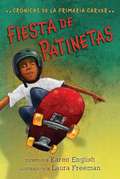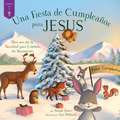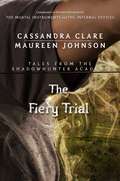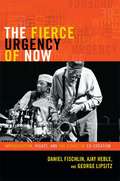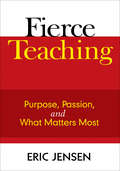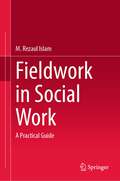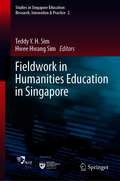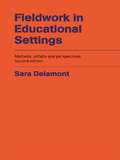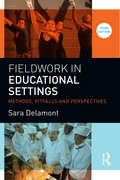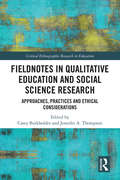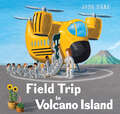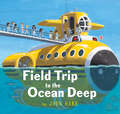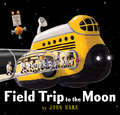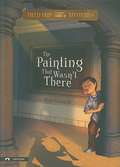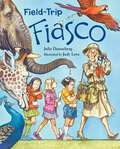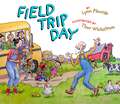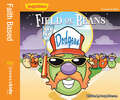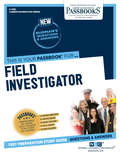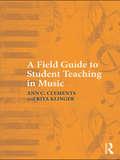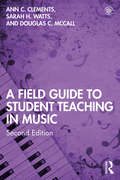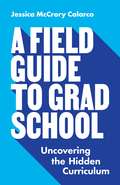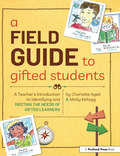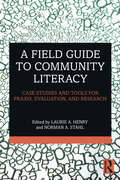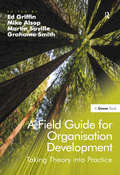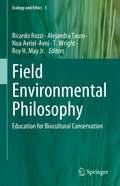- Table View
- List View
Fiesta de patinetas: Crónicas de la Primaria Carver, Libro 2 (The Carver Chronicles #2)
by Karen EnglishRichard no ve las horas de mostrar sus ollies en la fiesta de cumpleaños de su amigo en el parque de patinetas, pero una nota de su maestra sobre una tarea incompleta amenaza con arruinar sus planes. ¿Podrá Richard lograr posponer la firma de la nota hasta después de la fiesta (y enfrentar sus consecuencias)? ¿O eso solo le traerá más problemas?Esta serie de libros infantiles sobre un variado grupo de alumnos de primaria, escritos por Karen English, autora galardonada con el premio Coretta Scott King, ofrecen una narración precisa, personajes y situaciones con los que identificarse, y mucha acción. Los lectores emergentes y los flamantes lectores independientes se reconocerán en estas graciosas historias de la escuela y la familia.
Fiesta de Cumpleaños para Jesus: Dios nos dio la Navidad para Celebrar Su Nacimiento (Forest of Faith Books)
by Susan Jones¡Enseña a los niños pequeños a disfrutar la Navidad celebrando a Jesús! Las cálidas y adorables ilustraciones de animales atraerán a los prelectores y los primeros lectores e inspirarán su imaginación. El significado de Navidad a menudo se ve ensombrecido por la ola de comercialismo que lo precede. Es muy fácil para los niños perder de vista el verdadero significado de estas vacaciones cuando sus dibujos animados diarios incluyen una avalancha de comerciales de juguetes y su atención se centra en su propia lista de deseos. Este libro es un recordatorio reconfortante para los niños de que la Navidad no se trata de Papá Noel o de pedir regalos; se trata de celebrar el cumpleaños de Jesús. Este atractivo libro ilustrado a todo color cuenta una historia de animales del bosque que se preparan para un evento grande y emocionante. Cada página proporciona otra pista a los lectores jóvenes de que en algún lugar del bosque, un animal especial conoce el verdadero significado de la Navidad y quiere compartirlo con el resto de sus amigos del bosque. En la página final de la historia, los niños comprenderán mejor que la mayor alegría de la temporada navideña es celebrar la vida de Jesús con su familia y comunidad.
The Fiery Trial (Tales from the Shadowhunter Academy #8)
by Maureen Johnson Cassandra ClareSimon and Clary reunite as they witness a Parabatai ceremony...and discuss their own plans to be bonded. One of ten adventures in Tales from the Shadowhunter Academy.Simon and Clary act as witnesses to the parabatai ceremony of Emma Carstairs and Julian Blackthorn...and discuss their own parabatai plans in this precursor to The Dark Artifices. This standalone e-only short story follows the adventures of Simon Lewis, star of the #1 New York Times bestselling series, The Mortal Instruments, as he trains to become a Shadowhunter. Tales from the Shadowhunter Academy features characters from Cassandra Clare's Mortal Instruments, Infernal Devices, and the upcoming Dark Artifices and Last Hours series. The Fiery Trial is written by Cassandra Clare and Maureen Johnson. Read more of Cassandra Clare's Shadowhunter Chronicles in The Infernal Devices, The Mortal Instruments, and The Bane Chronicles.
The Fierce Urgency of Now: Improvisation, Rights, and the Ethics of Cocreation
by Fischlin Daniel Heble Ajay Lipsitz GeorgeThe Fierce Urgency of Now links musical improvisation to struggles for social change, focusing on the connections between the improvisation associated with jazz and the dynamics of human rights struggles and discourses. The authors acknowledge that at first glance improvisation and rights seem to belong to incommensurable areas of human endeavor. Improvisation connotes practices that are spontaneous, personal, local, immediate, expressive, ephemeral, and even accidental, while rights refer to formal standards of acceptable human conduct, rules that are permanent, impersonal, universal, abstract, and inflexible. Yet the authors not only suggest that improvisation and rights can be connected; they insist that they must be connected. Improvisation is the creation and development of new, unexpected, and productive cocreative relations among people. It cultivates the capacity to discern elements of possibility, potential, hope, and promise where none are readily apparent. Improvisers work with the tools they have in the arenas that are open to them. Proceeding without a written score or script, they collaborate to envision and enact something new, to enrich their experience in the world by acting on it and changing it. By analyzing the dynamics of particular artistic improvisations, mostly by contemporary American jazz musicians, the authors reveal improvisation as a viable and urgently needed model for social change. In the process, they rethink politics, music, and the connections between them.
Fierce Teaching: Purpose, Passion, and What Matters Most
by Eric P. JensenAchieve consistent, positive teaching results using these brain-compatible methods that are readily adaptable to individual learning styles, aligned with current research, and applicable to all grade levels.
Fieldwork in Social Work: A Practical Guide
by M. Rezaul IslamThis book is an essential resource meticulously designed for social work field placements. It offers students a structured pathway through the intricacies of real-world social work, equipping them with invaluable guidance, knowledge, and practical tools for success. Beginning with foundational concepts such as the meanings and scope of social work, the text progresses seamlessly into specialized topics like data collection, supervision, and challenges in fieldwork practices. Addressing critical aspects of social work field practice, the book delves into the significance of fieldwork, setting clear objectives, ethical considerations, and the roles and responsibilities of social workers. It navigates through diverse assignments and duties, emphasizing ethical dimensions, adaptability, client-centered approaches, and the integration of technology. Chapters on culturally responsive practices and professional skill development underscore essential competencies for effective interventions. With a global perspective, the book integrates examples and case studies from various countries, providing a comprehensive understanding of social work in diverse contexts. Additionally, it includes discussions on agency-level field practice, collaborative goal setting, evidence-based practices, and technology integration, reflecting the evolving landscape of social work and preparing students for contemporary challenges. Emphasis on reflective practice, learning, and report writing enhances students' skills for the transition from field placement to professional practice. Fieldwork in Social Work: A Practical Guide serves as an indispensable tool for both students and practitioners, empowering them to navigate the complexities of social work practice with confidence. Suitable for undergraduate and graduate social work students, it offers essential companionship throughout their fieldwork journey. Social work educators, field instructors, and supervisors will also find value in its structured framework for teaching, guiding, and supporting students. With its global perspective and coverage of emerging trends, the book remains a valuable resource for practitioners seeking to stay updated with the latest developments in the field.
Fieldwork in Humanities Education in Singapore (Studies in Singapore Education: Research, Innovation & Practice #2)
by Teddy Y. H. Sim Hwee Hwang SimThis book addresses the topic of humanities education fieldwork using the Singapore context as its primary focus. It explores how the thought processes behind and techniques of various humanities and social sciences subjects can be applied to fieldwork in a variety of school and training settings. In addition, it discusses how humanities students and educators could stand to benefit from utilizing fieldwork techniques and skills used in archaeology and anthropology, beyond undergraduates majoring in that discipline. Finally, the adoption of multidisciplinary approaches in fieldwork incorporating history, geography, literature and social studies demonstrate how these subjects can collaborate together in actual case studies to facilitate participants’ learning in the field.
Fieldwork in Educational Settings: Methods, Pitfalls and Perspectives
by Sara DelamontExtensively revised and updated, this new edition of Fieldwork in Educational Settings will be welcomed by researchers and academics in education and the social sciences. Embracing both sociological and anthropological approaches to qualitative research, the book covers education inside and beyond schools. It emphasises writing up ethnographic research and getting the project finished, and is packed with examples from research in progress.This new edition brings the original text right up to date for new researchers. There is an additional chapter on computer software for data handling and attention is given to the implications of postmodernism for writing up research. The examples given are taken from the latest research, replacing those from the first edition. This is an indispensable handbook by an author whose work on this subject is widely recognised as being an essential resource for the researcher in education.
Fieldwork in Educational Settings: Methods, pitfalls and perspectives
by Sara DelamontFieldwork in Educational Settings is widely recognised as part of the essential reading for the researcher in education. It instructs those new to qualitative educational research how to find interesting research sites, collect great data, analyse them responsibly, and then find the right audience to hear, use, and build upon their findings successfully. The revised and updated third edition includes the latest developments in authoethnography, data collection, analysis and dissemination, and is illustrated throughout with up-to-the minute examples of real world research. It embraces both sociological and anthropological approaches to qualitative educational research, using case studies from the USA, Canada, Australia and New Zealand as well as the UK. ‘Education’ is treated broadly, including higher education and non-formal settings as well as schools. Threaded throughout the book is updated content on: the internet and virtual worlds as sites for ethnography, the ethical aspects of ethnographic research, the strengths and weaknesses of autoethnography, the debates about representing data, the impact of technological innovations in all stages of qualitative research. An indispensable introduction for students and novice researchers alike, the new edition continues to illustrate and sustain the increasing popularity of qualitative methods in educational research over the past thirty years, addressing the technological and digital changes that have occurred.
Fieldnotes in Qualitative Education and Social Science Research: Approaches, Practices, and Ethical Considerations (Critical Ethnographic Research in Education)
by Casey Burkholder Jennifer A. ThompsonBuilding upon the incorporation of fieldnotes into anthropological research, this edited collection explores fieldnote practices from within education and the social sciences. Framed by social justice concerns about power in knowledge production, this insightful collection explores methodological questions about the production, use, sharing, and dissemination of fieldnotes. Particular attention is given to the role of context and author positionality in shaping fieldnotes practices. Why do researchers take fieldnotes? What do their fieldnotes look like? What ethical concerns do different types of fieldnotes practices provoke? By drawing on case studies from numerous international contexts, including Argentina, Cameroon, Canada, Ghana, Hong Kong, Hungary, Kenya, Lebanon, Malawi, the Netherlands, South Africa, and the US, the text provides comprehensive and nuanced answers to these questions. This text will be of interest to academics and scholars conducting research across the social sciences, and in particular, in the fields of anthropology and education.
Field Trip to Volcano Island (Field Trip Adventures)
by John HareA wordless picture book adventure takes a group of students to visit a thrilling volcanic island. Perfect for fans of Field Trip to the Moon, Field Trip to the Ocean Deep, and field trips in general!John Hare&’s rich, atmospheric art invites all children to imagine themselves in the story – a story full of surprises and adorable new friends.The same students we met in Field Trip to the Moon and Field Trip to the Ocean Deep travel to a volcano island on a yellow school bus helicopter. When they get there, one student picks flowers as they hike to the top and then accidentally slips down a crater and can&’t get out.The student isn&’t too worried--especially when he meets a lava monster and its children who are fascinated by the flowers. But when they touch them, they burn beyond recognition so the student teaches them how to make a vase using lava from a lava pit, fills it with water from a canteen, and they all sit back to enjoy the flower arrangement until help arrives and rescues the student.A Junior Library Guild Gold Standard SelectionPraise for previous books by John Hare Field Trip to the MoonA Junior Library Guild Gold Standard SelectionA School Library Journal Best Book of the Year A Horn Book Best Book of the Year A Bank Street Best Book of the Year - Outstanding Merit Field Trip to the Ocean DeepA Junior Library Guild Gold Standard Selection"Fans of the previous field-trip story will be pleased to see allusions to it, including character cameos and a glimpse of the space bus."—The Horn Book
Field Trip to the Ocean Deep (Field Trip Adventures)
by John HareCome join the fun as students take a submarine bus on a field trip to explore the ocean deep, in this wordless picture book from the creator of Field Trip to the Moon!Students dressed in deep sea helmets travel to the ocean deep in a yellow school-bus submarine. When they get there, they frolic with fish, chase luminescent squid, and discover an old shipwreck. But when it's time to return to the submarine bus, one student lingers to take a photo of a treasure chest and falls into a deep ravine. Luckily, the child makes an unexpected friend-- a maybe-not-so-extinct sea creature called a Pleiosaur- that's happy to entertain the young explorer until the teacher returns. In his follow-up to Field Trip to the Moon, John Hare's rich, atmospheric art in this wordless picture book invites all children to imagine themselves in the story- a tale full of mysteries, surprises, and adorable aquatic friends. Named a LITA Golden Duck Picture BookA Junior Library Guild Selection
Field Trip to the Moon (Field Trip Adventures)
by John HareIt's field trip day, and students are excited to travel on their yellow spaceship bus from their space station to the moon in this wordless picture book.An ALA Notable Children's BookA Golden Duck Notable Picture BookClimb aboard the spaceship bus for a fantastic field trip adventure to the moon! Once their bright yellow ship lands, students debark and set out with their teacher to explore. They jump over trenches and see craters and mountains on the moon's surface and even Earth in the faraway distance. But when one student takes a break to draw some pictures and falls asleep, they wake up to discover that the rest of the class and the spaceship are gone. How the student passes the time waiting to be rescued makes for a funny and unexpected adventure that will enchant children all over the galaxy.With rich atmospheric art, John Hare's wordless picture book invites children to imagine themselves in the story--a story full of surprises including some friendly space creatures. A perfect complement to discussions and lessons on the moon landing.Don't miss Field Trip to the Ocean Deep, another wordless adventure! Recipient of the Pied Piper Literary PrizeAn ILA-CBC Children's Choice!A Pennsylvania Center for the Book Baker's Dozen Selection!A School Library Journal Best Book of the YearA Horn Book Best Book of the YearA Bank Street Best Book of the Year - Outstanding Merit
Field Trip Mysteries: The Painting That Wasn't There
by Steve BrezenoffJames "Gum" Shoo's art class heads to the museum. They've been learning about forged art, but they never expected to find a fake in the gallery! Only Gum and his gumshoe friends will be able to solve this museum caper.
Field-Trip Fiasco (The Jitters Series #5)
by Julie DannebergSarah Jane Hartwell and her class are back. After the stress of her last attempt at taking her class on a field trip (seen in First Year Letters), Mrs. Hartwell has a plan for an upcoming trip to the zoo—a plan that includes a lot of rules. Her students prove that they can line up straight, walk quietly, and take plenty of notes, but everyone soon realizes that this field trip isn’t as much fun as they’d hoped. Mrs. Hartwell rethinks her plan and saves the day.
Field Trip Day
by Lynn PlourdeToday is Field Trip Day at school, and everyone in Mrs. Shepherd?s class is excited to visit Fandangle?s Farm, especially Juan, who loves to explore. But Juan just might be too good at exploring, and Mrs. Shepherd and the chaperones have trouble keeping track of him! This sixth story about the silly students in Mrs. Shepherd?s class will have readers laughing and learning as Juan?s discoveries lead to new teaching opportunities for Farmer Fandangle and Mrs. Shepherd.
Field of Beans / VeggieTales: A Lesson in Faith (Big Idea Books / VeggieTown Values)
by Doug PetersonJunior Asparagus discovers a lesson in faith as he learns how to rely on God in times of trouble. Junior realizes that he must have faith to be a real winner.
Field Investigator: Passbooks Study Guide (Career Examination Series)
by National Learning CorporationThe Field Investigator Passbook® prepares you for your test by allowing you to take practice exams in the subjects you need to study. It provides hundreds of questions and answers in the areas that will likely be covered on your upcoming exam.
A Field Guide to Student Teaching in Music
by Ann C. Clements Rita KlingerA Field Guide to Student Teaching in Music is a practical guide focused on the link between music education coursework and the field-based aspects of the student teaching experience. It addresses general topics that are common to all music placements, as well as those topics that are of specific interest to the general, choral, and instrumental music classrooms. This text builds on theoretical materials typically covered in music methods courses, yet it is not specific to any one particular teaching pedagogy, making it flexible enough for use in a variety of music teaching settings. It will guide students through the student teaching process as they make the transition from student to music educator.
A Field Guide to Student Teaching in Music
by Ann C. Clements Sarah H. Watts Douglas C. McCallA Field Guide to Student Teaching in Music, Second Edition, serves as a practical guide for the music education student, one that recognizes the importance of effective coursework while addressing the unique field-based aspects of the music classroom. Student teaching in music is a singular experience, presenting challenges beyond those encountered in general education classroom settings: educators must plan for singing and movement, performances and rehearsals, intensive parent involvement, uniforms, community outreach, and much more. This guide explores such topics common to all music placements as well as those specific to general, choral, and instrumental music classrooms, building on theoretical materials often covered in music methods courses and yet not beholden to any one pedagogy, thus allowing for a dynamic and flexible approach for various classroom settings. New to the second edition: Companion website featuring downloadable worksheets, résumé support, a cooperating teacher guide, and more: www.musicstudentteaching.com A new chapter on the transition from student to student teacher Expanded discussions on the interview process, including mock interviews, interviewing techniques, and online interview prep Updated content throughout to reflect current practices in the field. Leading readers through the transition from student to teacher, A Field Guide to Student Teaching in Music, Second Edition, represents a necessary update to the first edition text published a decade ago, an indispensable resource that provides the insights and skillsets students need to launch successful careers as music educators.
A Field Guide to Grad School: Uncovering the Hidden Curriculum (Skills for Scholars)
by Jessica McCrory CalarcoAn essential handbook to the unwritten and often unspoken knowledge and skills you need to succeed in grad schoolSome of the most important things you need to know in order to succeed in graduate school—like how to choose a good advisor, how to get funding for your work, and whether to celebrate or cry when a journal tells you to revise and resubmit an article—won’t be covered in any class. They are part of a hidden curriculum that you are just expected to know or somehow learn on your own—or else. In this comprehensive survival guide for grad school, Jessica McCrory Calarco walks you through the secret knowledge and skills that are essential for navigating every critical stage of the postgraduate experience, from deciding whether to go to grad school in the first place to finishing your degree and landing a job. An invaluable resource for every prospective and current grad student in any discipline, A Field Guide to Grad School will save you grief—and help you thrive—in school and beyond.Provides invaluable advice about how to:Choose and apply to a graduate programStay on track in your programPublish and promote your workGet the most out of conferencesNavigate the job marketBalance teaching, research, service, and life
A Field Guide to Gifted Students: A Teacher's Introduction to Identifying and Meeting the Needs of Gifted Learners (Other Ser.)
by Charlotte Agell Molly KelloggA Field Guide to Gifted Students is a practical manual to the unique characteristics of gifted and advanced learners. Presented as a concise 32-page, full-color booklet available in sets of 10 print copies or a single eBook copy, this resource: Can be used in teacher workshops and other group professional learning settings. Assists educators in understanding and meeting the academic and social-emotional needs of gifted students. Includes a companion online facilitator's guide. Features practical tips based on current research and best practices. Is packed with illustrations, checklists, space to write notes, and a glossary of terms. School can feel like the wrong fit for many gifted learners, but through learning how to notice and support gifted students' diverse traits and needs, educators can build ideal classroom climates for student success. Readers will understand how to identify giftedness and related traits, including twice-exceptionality, introversion and extroversion, perfectionism, sensitivity, and intuitiveness. The online facilitator's guide includes everything workshop leaders need to conduct a brief course for classroom teachers, coordinators, counselors, or even parents.
A Field Guide to Community Literacy: Case Studies and Tools for Praxis, Evaluation, and Research
by Laurie A. Henry Norman A. StahlThis practical guidebook presents trends, research-grounded strategies, and field-based solutions to challenges of working in community-based literacy initiatives. A comprehensive guide for practitioners, this book addresses best practices for implementing, maintaining, expanding, and evaluating community-based literacy initiatives. The contributors in this volume help readers shift thinking from merely considering, "How can communities support literacy?" to "How can literacy help us create, support, and strengthen communities?" Organized into four parts – on building community through literacy, program design, case studies from the field, and program evaluation – chapters cover research-based and innovative practices in a diverse range of populations and settings, including family services, adult literacy initiatives, community centers, and tutoring programs. With an abundance of praxis-oriented examples and real-world strategies from top scholars and practitioners, the book serves as a roadmap for essential topics, including funding, writing grant proposals, handling audits, and conducting research within program settings. With templates, models, planning tools, and checklists ready for immediate use, this book is an invaluable field manual for individuals involved in community literacy work, researchers, and students in literacy-oriented courses either at the undergraduate or graduate levels.
A Field Guide for Organisation Development: Taking Theory into Practice
by Ed Griffin Mike Alsop Martin Saville Grahame SmithOrganisation Development, as a field, is messy, imperfect and hard to get hold of - it is like nailing jelly to the wall. A Field Guide for Organisation Development offers a variety of perspectives and unparalleled experiences from practitioners and researchers who all share an interest and involvement in Organisation Development (OD). In it are multiple voices, mindsets and practices - not all of which necessarily agree with each other. Leading OD practitioners present a contemporary, practical guide that tackles the dilemmas and polarities that face anyone studying or practising within the OD arena, and encourages them to develop their own particular practice of OD in a way that is appropriate for their context, skills and preferences, while challenging them to look beyond what comes naturally. Here are new ways to support the growth and development of an organisation from modest endeavours that are small in scale to organisation-wide change programmes. A Field Guide for Organisation Development is as comprehensive a resource to support the practice of OD as can be found anywhere. It covers issues of organisational health as well as offering tools aimed at supporting practitioners to survive in the harsh realities of organisational life. It contains chapters on the OD practitioner, on groups, on culture, on data and evaluation. It offers perspectives on change, on the relationship between OD and HR, and on the use of external consultants.
Field Environmental Philosophy: Education for Biocultural Conservation (Ecology and Ethics #5)
by Ricardo Rozzi Alejandra Tauro Noa Avriel-Avni T. Wright Roy H. MayThis fifth volume in the Ecology and Ethics series integrates key concepts of the previous four volumes by addressing biocultural conservation through novel educational methods. In Field Environmental Philosophy (FEP), the authors undertake two complementary tasks. First, they address a problematic facet of education as an indirect driver of a global change and biocultural homogenization. Second, they contribute to solve the former problems by introducing the FEP method as well as other educational approaches from around the world that value and foster conservation of biological and cultural diversity. A particular emphasis is therefore on the integration of sciences, arts, humanities, and ethics into educational practices that involve the participation of local communities with their diverse forms of ecological knowledge and practices. The book is divided into four parts. Part I introduces FEP concepts and practices that involve a 4-step cycle of transdisciplinary research, poetic communication through composition of metaphors, design of field activities guided with an ecological and ethical orientation, and participation in biocultural conservation activities. Part II exposes problems as well as solutions in formal education (from preschool to higher education) and non-formal education to respect biocultural diversity. Parts III & IV provide case studies developed at long-term socio-ecological research (LTSER) sites, botanical gardens, and other platforms for non-formal education that contribute to biocultural conservation.This book supports a paradigm shift addressing still understudied indirect drivers of global change to foster the conservation of biological and cultural diversity. It is a valuable asset for scientists and practitioners in science and humanities education.
